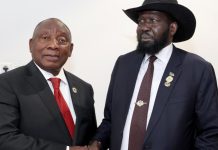Africa-Press – South-Africa. Former president says Zuma’s alleged involvement in the capture of Sars shows he was determined to dupe SA regarding his intentions
Former president Thabo Mbeki has again torn into his successor Jacob Zuma, this time labelling him a “wolf in a sheep’s skin” for his alleged involvement in the attempts to collapse Sars.
Addressing the 30th anniversary of South Africa’s democracy at Freedom Park, Tshwane, on Tuesday, Mbeki said the only conclusion he could make on the actions of Zuma was of a counter-revolutionary whose presidency was targeted at duping the nation.
Quoting both the Nugent commission into Sars and the Zondo commission, Mbeki said that they had made an observation that Zuma during his presidency was involved in the attempts to weaken Sars.
The Nugent commission, he said, had found that Zuma held direct consultations with Bain & Company which was found to have been at the heart of the capture of Sars by Zuma and the then commissioner Tom Moyane.
Mbeki questioned why Zuma would be part of attempts to render ineffective Sars which was responsible for the majority of the government’s revenue.
“Obviously, this confronts us with a conundrum. Here, according to the judicial commissions, we have a head of government who joins a process to reduce the very revenues he needs to enable the government to discharge its responsibilities, up to the point of the possible collapse of that government. How do we explain this puzzle,” asked Mbeki.
The only explanation, Mbeki said, was that Zuma was a wolf in a sheep’s skin.
“The only logical way to explain this is that, challenging as this might be even to comprehend, here we are dealing with a wolf in sheep’s skin,” he said. “Accordingly, in terms of this logic, the involvement of such a ‘wolf’, so to speak, in the effort to destroy Sars would not be surprising, as it would represent the discharge of its responsibilities as part of the counterrevolution. Time will tell whether this logical deduction is in fact correct.”
Mbeki labelled Zuma’s actions as counter-revolutionary and sought to suggest that he was part of apartheid agents who infiltrated the ANC after 1994.
This began in 2002 with a decision to change the leadership structure that was at the time led by Mbeki, he said.
It was at the 2007 ANC Polokwane conference that this “counterrevolution” manifested itself when he was ultimately removed as president of the party at the conference that ushered in Zuma.
The divisions within the ANC are mainly attributed to this conference which eventually saw those who had supported Mbeki’s move for a third term leave the ANC to form COPE.
Mbeki believes the decision to oust him as ANC president and a short while later as the president of the country was part of the counterrevolution.
Merriam-Webster describes counterrevolution as “a revolution directed towards overthrowing a government or social system established by a previous revolution”.
This explains why Mbeki is adamant that there was a hand of the apartheid government behind the move to remove him.
“This is (why) the apartheid regime paid a lot of attention to the task to infiltrate as many of its agents as possible into the ANC and the rest of the broad democratic movement,” he said. “Though much was done by the ANC to discover and expose these enemy agents, the hard reality is that a considerable number remained undetected within our ranks.
“Quite early after the formation of the 1994 government of national unity, we approached the heads of the former SADF, the SAP and NIS to request that they give us the lists of these agents so that we could discuss with and demobilise them. Effectively, all three services turned down our request. The counterrevolution used these agents in the ranks of the ANC to intervene in the Polokwane national conference as it did.”
Mbeki has dismissed the notion that has been going around, especially ahead of the May 29 election, that the ANC-led government had “completely failed” in the past 30 years.
“The charge that some make repeatedly, that the past 30 years of our democracy have been a disastrous period for our country and people, is entirely false and serves ignoble purposes,” he said.
“Rather, the achievements realised as a result of the efforts of our people as a whole during the first 13-15 years of our democracy demonstrate this vitally important consideration that together we have the capacity to take this country to great heights.
“More than this, it makes the statement that regardless of our situation today, we will certainly enter into a new beginning, to resume the labour of love once more to build a winning nation, a people-centred and caring society.”
For More News And Analysis About South-Africa Follow Africa-Press






